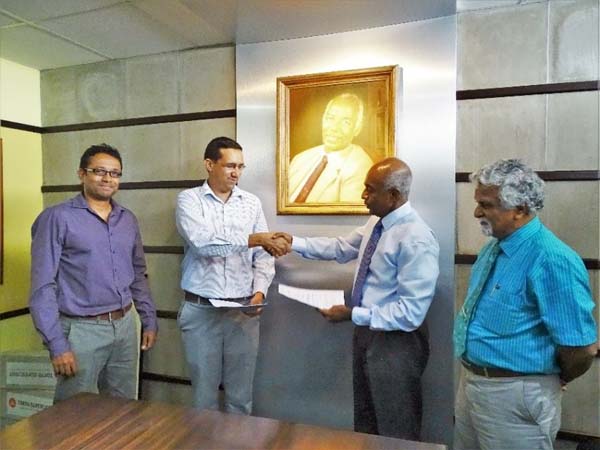
Tokyo Cement Group join forces with Blue Resources Trust to give our Coral Reefs a new lease of life
Blue Resources Trust, a marine research organization dedicated to facilitate the sustainable use of marine resources, announces the formation of a MOU with Tokyo Cement Group to further their commitment to conservation. The organization, with extensive local and international research experience, anticipates this partnership to strengthen their work to promote science-based decision-making as the foundation of conservation efforts. Further, the partnership will be to develop education programs, build awareness and encourage greater participation of local communities. The MOU, encompassing a multimillion rupee investment spanning a period of three years, will build upon Tokyo Cement’s active reef restoration efforts with Blue Resources’ research expertise.
The partnership will mainly assist the Coral Reef Rehabilitation initiative carried out by the cement giant along the Eastern coastline of Sri Lanka. Over the past few years Tokyo Cement has championed the cause of restoring the natural reef barrier around the country. The company is the frontrunner in channeling resources and rallying stakeholders to make coral conservation and propagation a national initiative. To this end, Tokyo Cement has formed partnerships with numerous groups such as the Wildlife Conservation Trust, the Navy and the Wildlife Department to maximize the impact of the work they do, effectively fusing different areas of expertise and strengths.
Co-Founder of Blue Resources Trust, Marine Biologist Mr. Daniel Fernando, at the signing the MOU stated, “Blue Resources is excited to establish this partnership with the Tokyo Cement Group to expand research and conservation activities focused on the coral reefs of Sri Lanka. These critical and increasingly vulnerable environments are often overlooked when development projects are prioritised, however coral reefs form an essential part of our ecosystems and help maintain the delicate balance that preserves both coastal and marine resources; upon which multiple communities are heavily dependent. This partnership, linking scientific conservation with industry, will aim to improve our understanding of coral reefs which in turn will enable better management of these valuable resources.”
The Coral Reef restoration project of Tokyo Cement will be elevated to a whole new level with this MOU signing, with Blue Resources now engaged to bring in their expertise in globally recognized underwater survey methods to monitor coral growth.
Tokyo Cement uses recycled ready mix concrete to create artificial structures called Reef Balls that are used as substrate for new corals to settle on. Partnering with WRCT, the Wildlife Dept., Blue Resources and the Sri Lanka Navy the reef balls are placed on the ocean bed in areas such as Pasikudah, Kayenkerni, Dutch Bay, Pigeon Island, all the way up to Jaffna. Knowledge sharing, planning, and collaborating on field work, will assist the reef restoration initiative to gain quality insights to measure progress and effectively charter the course of activities for best results.
Tokyo Cement’s commitment to ensure the sustainability of the project is stamped by getting direct and indirect beneficiaries involved. They include local fishing communities, the tourist industry and the Navy, whose collective efforts will not only help curb adverse activities but also propagate awareness among a much larger stakeholder community and the general public.
This holistic approach towards Coral Reef Restoration has the potential to be the most impactful conservation programs to be undertaken by a corporate entity. This far-reaching initiative dealing with conservation, propagation, scientific research, continuous monitoring and education was recognized by the Ceylon Chamber of Commerce in 2014 as the Best Environmental CSR project.
Tokyo Cement Group is also the driving force behind the mangroves reforestation program, where they collaborate with a few other organizations to replant mangrove saplings along the Eastern coastline of Sri Lanka, in a bid to preserve these complex and endangered habitats. The company’s commitment to social responsibility breathes life in and through initiatives such as this, where they successfully integrate social welfare and environmental conservation into its corporate DNA as part of their continuous mission to enrich the country, its people and the environment.


